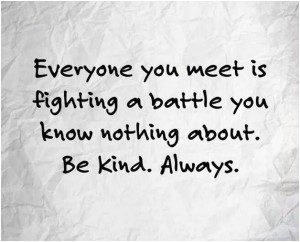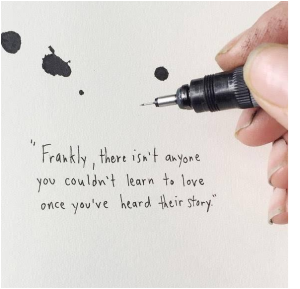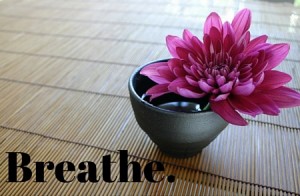Today I am hosting my first ever guest post. It’s something I’ve thought about doing for a while – inviting others to share their words in my space – but hadn’t taken the initiative to organize. A few nights ago I received a message from a former student, from my senior year of high school when I was a student teacher in our religious education program, and she was a 7th grader. Now, years later, she reached out and asked if I’d share something she wrote. Yes!, I responded. Anything, anytime. She sent me her post that very night.
So, here you go: What follows are Melissa’s own thoughts and words. I think you will find that she and I have many of the same philosophies and ideas – enjoy!
Contrasting Being Connected with Just Connections
Today, journaling didn’t feel like enough. My words were jumping off the page. It seemed like they were screaming “share me”! So, in an effort to practice the things I value and find important, namely vulnerability and storytelling, I took a risk. I stepped out of my comfort zone. Here’s what I wrote:
Recently, the pervasiveness of social media in our everyday life has been at the forefront of my mental energy. Sometimes I feel like Facebook is mostly about keeping up appearances. I don’t actually find it very authentic at all. It’s simply a crafted glimpse into someone’s life. I am always intrigued to see what people are posting and sharing but as for myself, I’m never really that “open” or thoughtful on Facebook. So, to put it bluntly, if you’re only following me on Facebook I say to you, “you don’t know my life”. For some many people I know I am passively following their lives and occasionally liking their posts but that’s the extent to which we are “connected”. This managed identity gives way to statements such as this “Well, it seems like you’re busy and having a lot happening right now…” when you’d rather be asked ‘how are you today?”. Which, if we’re being honest. Most of us post more online on the days when we ARE struggling (or bored, lonely, anxious, etc.). For me, I post more on days that I’m not insanely busy and on days when even an hour of free time is overwhelming because I don’t want to be “stuck” in my own head. There’s a certain solace in social media. Furthermore, the paradox that we’re more alone and independent than any previous generation yet we thrive off of constant connectivity challenges me often. In a lot of ways it seems like in an effort to combat our own inner perceived notions of mediocrity we continue to strive for and subsequently advertise external achievements to build ourselves up. In this way, we perpetuate a definition of success that is controlled by comparison and that implies that we must burn out, or DO ALL THE THINGS to be successful. I wonder how much of this external confidence hosted by social media is a cover for the insecurities so many of us encounter each day.
But, I’ve decide to address and reframe this frustration with social media by looking at the positives. A couple months ago, I posted the following Facebook status: “Here’s what’s on my mind: Sometimes I feel like I could make a pretty strong argument as to why I should never work or go to school and instead be on social media all day. Everywhere I look recently, people are posting articles or statuses that make me think and help me to learn more. So, I feel like in some ways, Facebook is its own classroom. Maybe you have to know the right people…” This clickbait classroom has taught me a lot recently. I find myself scrolling through the various feeds I subscribe to with a different eagerness. I am seeking the thoughtful motivational quotes and pictures, latest news coverage, or exciting life events. I’m not reading Facebook seeking validation of my life or to fuel FOMO but instead I’m being inspired, much like how I anticipate this post will be received, by those who are taking chances and sharing more of themselves and their beliefs.
Earlier this year, a friend of mine encouraged me to listen to Brene Brown’s TED talk about vulnerability. I gained two important messages from Dr. Brown’s talks. First, we live in a time where we are continually confronted with unattainable, conflicting, competing expectations about who we’re supposed to be. To me, this is further compounded by the constant need for validation, justification, and approval that churns in our mind even when we’re not willing to admit that it’s there. I struggle with these notions because they are contradictory. How can one seek approval if they’re not even sure who they’re supposed to be or what they’re hoping to achieve? In so many ways, social media perpetuates this.
The second thing I took away from Dr. Brown’s talks is this: it’s okay to be seen and heard. When I first heard this, I exhaled a sigh of relief. I felt like I was being granted permission to be proud of myself without fearing disapproval or being perceived as arrogant. Then, I stopped thinking about myself and realized, the best way I can embrace Dr. Brown’s message is by advocating for sharing and truly hearing stories. Stories have a special place in my heart. Stories connect us. They help us learn empathy and foster lifelong relationships. They are also the foundation of our society (think history class). Recently, I’ve been fascinated with stories! Both understanding my story and learning others’ has given me space to be critical and also to explore.
A brief digression to share some relevant resources: When I found out about The Strangers Project I was so excited. Check it out! More stories! More things to question and consider. Of course, I couldn’t view this site without thinking about my favorite TED talk, “The Danger of a Single Story” or the blog post from my incredible semester in Cape Town that inspired my love for stories and craving for understanding.
The story motif is not transient in my life. It’s complemented by a desire for everything, every moment to be a learning opportunity. Therefore, when a friend shared with me a difficult part her story recently I was again challenged by this sharp dichotomy of internally and externally facing selves. I never knew th at about her but I considered myself privileged to learn more about her personal life. I don’t have a lot of conversations that aren’t either super intellectual or very surface level (this is intentional, those spaces are safe and I can easily contribute and not feel overwhelmed typically). This is also mostly because I don’t reciprocate well and because I usually don’t have the words to participate in the way that person expects me to respond when they tell me personal things. But, I’ve been practicing vulnerability lately and I’m appreciative for conversations that model this important, powerful skill. While I never want anyone to struggle it was important for me to be reminded that everyone has their story and their challenges but also their composure that they put out to the rest of the world. That was influential for me. I learned a lot about myself and about friendship from that worthwhile exchange.
at about her but I considered myself privileged to learn more about her personal life. I don’t have a lot of conversations that aren’t either super intellectual or very surface level (this is intentional, those spaces are safe and I can easily contribute and not feel overwhelmed typically). This is also mostly because I don’t reciprocate well and because I usually don’t have the words to participate in the way that person expects me to respond when they tell me personal things. But, I’ve been practicing vulnerability lately and I’m appreciative for conversations that model this important, powerful skill. While I never want anyone to struggle it was important for me to be reminded that everyone has their story and their challenges but also their composure that they put out to the rest of the world. That was influential for me. I learned a lot about myself and about friendship from that worthwhile exchange.
I was inspired to write this post today because in the midst of being inundated with thoughts about the power of storytelling and being distracted by the overwhelmingness of managing my external life on Facebook I scrolled past these two meaningful and complementary images that spurred my thinking about stories and vulnerability once again!
 So here’s my plea: rather than exhausting ourselves with the tiring task of crafting an identity that fits our mental images of what “success” and “happiness” look like, let us spend more time seeking, sharing, and honoring each other’s stories! I think this is best practiced through conversation and the commitment to creating safe spaces for diverse voices and experiences to thrive and be appreciated. When we stop comparing and competing and begin appreciating and recognizing we give power to individuals and let each person own where they’ve been and where they hope to go. We let each individual grow into and with their story and contribute to an identity they can be proud of and others can love regardless of the hurdles and struggles along the way. I hope that through sharing and supporting each other’s stories rather than fortifying spaces of harsh, judgments based on uninformed impressions we can grow and learn together and from each other and reserve judgment by recognizing that this is THEIR lived experience and their truth regardless of what they post on social media.
So here’s my plea: rather than exhausting ourselves with the tiring task of crafting an identity that fits our mental images of what “success” and “happiness” look like, let us spend more time seeking, sharing, and honoring each other’s stories! I think this is best practiced through conversation and the commitment to creating safe spaces for diverse voices and experiences to thrive and be appreciated. When we stop comparing and competing and begin appreciating and recognizing we give power to individuals and let each person own where they’ve been and where they hope to go. We let each individual grow into and with their story and contribute to an identity they can be proud of and others can love regardless of the hurdles and struggles along the way. I hope that through sharing and supporting each other’s stories rather than fortifying spaces of harsh, judgments based on uninformed impressions we can grow and learn together and from each other and reserve judgment by recognizing that this is THEIR lived experience and their truth regardless of what they post on social media.
(Melissa Lovitz is a recent graduate from the University of Connecticut where she studied Human Development & Family Studies and Public Policy. Currently she is a graduate student at Brown University in the Urban Education Policy Program focusing on family and community engagement in urban communities.)


 at about her but I considered myself privileged to learn more about her personal life.
at about her but I considered myself privileged to learn more about her personal life.

